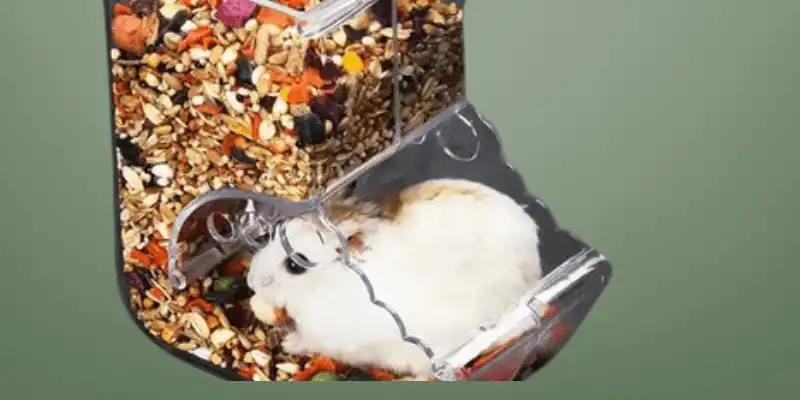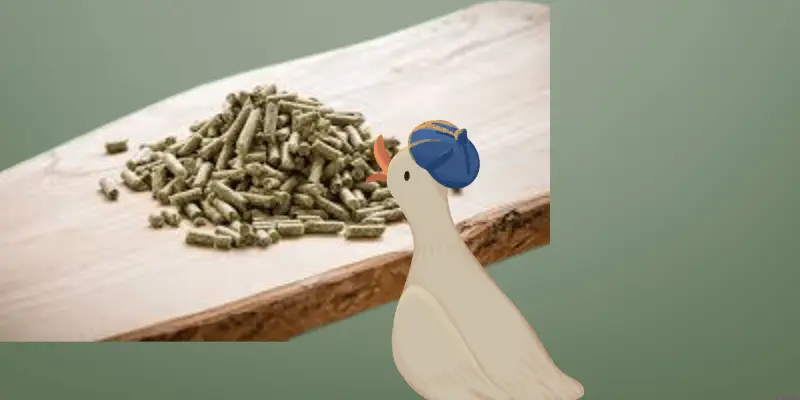A Comprehensive Guide About Can Ducks Safely Eat Rabbit Food In Their Diet
Updated: 03 Mar 2024
1547
When pondering whether can ducks eat rabbit food, the short answer is yes. However, as someone who has spent years keeping ducks, I’ve learned that while they can swallow pretty much anything that fits into their mouth, not everything you offer them is beneficial.
Rabbit pellets, for instance, contain a level of salt that isn’t ideal for a duck’s diet. If they accidentally consume rabbit food, it won’t necessarily harm them, but it shouldn’t become the main source of their diet.
In my experience, ducks should primarily feed on duck-specific feed, with rabbit food only given as snacks or a treat. Proper rabbit feed is high in fiber and low in calories, making it somewhat suitable for ducks and chickens alike, but always check the contents before making a decision.
Making an informed choice involves understanding the nutritional contents and ensuring the feed is low in salt and bad additives, thereby preventing any harm to your feathered friends.
So, when considering what to feed your ducks, remember that while they can eat a variety of foods, not all are proper for maintaining their health.
Can Ducks Eat Rabbit Food?
Diving into whether ducks can eat rabbit food, it’s crucial to highlight from my own journey with these feathered friends that while they might find rabbit pellets appealing, such food is not made to meet their nutritional needs.
Indeed, rabbit food can serve as an occasional treat, but it’s a far cry from being a suitable replacement for commercial duck food. Many fellow duck enthusiasts often urge me with questions about serving rabbit food to ducks.

My answer? It’s vital to discover through reading and consulting with avian nutritionists that certain elements in rabbit food could potentially mess up a duck’s diet if not given in moderation.
This knowledge nudges us towards a balanced approach, ensuring our ducks’ diets are well-rounded and tailored to their unique dietary requirements, rather than relying on convenient but nutritionally inadequate options.
What Are Rabbit Pellets and Food?
Rabbit food is often mistaken as just that, food, when in reality, rabbit pellets are compressed alfalfa hay, developed as a safe and easy way to feed rabbits in large numbers or as pet rabbits. However, these pellets are not good for ducks to have as a staple in their diet.
Unlike rabbits, which are strict herbivores, ducks are omnivorous, thriving on a diet that includes vegetables, fruits, plants, and sometimes meat, which they can digest without feeling sick.
Commercial rabbit food typically contains hay, protein, and calcium at levels that are low enough not to cause issues if given as an occasional snack, but relying on it for an extended period could compromise a duck’s long-term health.
Different kinds of Rabbit Ducks Eat:
Ducks eat rabbit food but in different variants to meet their nutrients and daily food needs as well. Some rabbit food variables for ducks are as follows.
Can Ducks Eat Rabbit Pellets?
Technically, ducks can eat rabbit pellets as both species are mammals with similar nutritional needs. Yet, there’s an important difference to note: the salt content. Rabbit pellets contain sodium levels that aren’t healthy for ducks to consume in large quantities.
An accident here or there might not cause harm, but making it a habit is ill-advised due to the availability of better foods with higher nutritional value, lower sodium content, and less potentially harmful additives.
Can Ducks Eat Rabbit Food Pellets?
Rabbit food pellets, made of compressed alfalfa, can be included in a duck’s diet in small amounts. They are high in protein and calcium, and beneficial in moderation. However, the problems arise with excess phosphorus, which can be harmful.

Therefore, it’s best to feed ducks rabbit food pellets only on rare occasions, treating them as an occasional treat or reward, rather than a main source of their diet.
Can Ducks Eat Rabbit Food Cake?
When it comes to rabbit food cake, it’s a type of feed not typically suited for rabbits nor ducks unless it is specially formulated with reduced salt content for duck consumption.
The regular mix lacks the nutrients ducks require, making fresh fruits and vegetables a much better alternative. So, while it might seem like an interesting idea, rabbit food cake should be bypassed in favor of more nutritionally appropriate options.
Can Ducks Eat Rabbit Food Nuts?
Interestingly, ducks can indeed enjoy rabbit nuts, akin to human nuts, as treats that alleviate boredom within their enclosure or outside area.
They particularly enjoy watermelon seeds but can safely consume any type of nut or seed. Care should be taken not to overeat, as there’s a risk they might become malnourished from a lack of protein if fed in excess.
Can Ducklings Eat Rabbit Food?
Ducklings can nibble on rabbit food as an occasional treat or reward, but there are better foods that should be fed to ensure they grow up healthy. Rabbit food, which may contain too much salt and other ingredients, could potentially make them sick.
It’s advisable to avoid giving them wild plants, weeds, flowers, or anything with poison ivy, oak, or if you’re unsure whether a plant is safe. After 4 weeks old, ducklings can be introduced to rabbit food, but I wouldn’t recommend it as a regular diet.
They need nutritional facts that support their growth, like adequate calcium to maintain a strong bone and skeletal structure within their body system.
Will Ducks Eat Rabbit Droppings?
Yes, ducks might peck at rabbit droppings if they’re hungry enough, but it’s not good for them. These droppings contain salt and other ingredients that could make them sick.
While ducks may feed on rabbit food pellets, it’s the droppings from this food, rather than regular drops of food or water residue, that are more likely to be eaten. However, relying on this as a food source is not advisable due to the potential health risks involved.
Can Wild Ducks Eat Rabbit Food?
The short answer is yes, wild ducks can eat rabbit food. As omnivorous animals, they have a diverse diet that includes protein from meat, but rabbit feed is designed for herbivores that subsist on veggies and fruits and don’t eat meat.
While rabbit food won’t harm them and can be a part of their diet, it doesn’t fully meet the nutritional needs of wild ducks due to the lack of meat-based protein.
How Much Rabbit Food Can Ducks Eat?
Many people ask how much rabbit food ducks can safely consume without overfeeding. Although too much of it can be bad, a little bit can provide good nutrients they need. It’s essential to consider the type of rabbit food available on the market, as not all are created equal.
The best possible option would be one that’s high in fiber and low in fat. A general rule of thumb is about 1/4 cup per day; more than that, and they might put on weight. So, moderation is key, and it’s fine to increase or decrease this amount based on how your ducks are doing.
What Are The Benefits of Ducks Eating Rabbit Food?
The benefits of ducks eating rabbit food include a nutritious diet that helps them grow and thrive. Rabbit food is packed with proteins, essential fats, vitamins, and minerals necessary for ducks to stay healthy.
Since rabbits are herbivores and their food consists mainly of plants, it’s easy to digest for omnivores like ducks.
Although their diet should be mostly plant-based, rabbit food can be a cheap alternative to save money on duck-feeding costs, especially if you live in an area with not many ducks and it’s widely available.
Are There Any Risks Associated With Ducks Eating Rabbit Food?
However, there are risks associated with ducks eating rabbit food. They could become malnourished if not getting enough of the right nutrients. Rabbit food could also contain harmful bacteria or parasites that might make ducks sick.
Too much rabbit food can lead to obesity, resulting in a variety of health problems. Therefore, it’s crucial to balance their diet and monitor for any adverse effects.
How Often Should Ducks Eat Rabbit Food?
Ducks, being omnivorous, require a diet that includes both plant and animal food, though it should be mostly plant-based. Duck owners might wonder about the frequency of feeding rabbit food, especially since rabbits and ducks have very different diets.
Rabbit food, mostly hay and a small amount of vegetables, is not as easily digestible as duck-specific food. While ducks can digest rabbit food better than rabbits, feeding them too much can be harmful, as it’s high in fiber and could cause ducks to become overweight.
The best way to determine the appropriate frequency is to talk to a veterinarian for specific advice on the health of your ducks.
Conclusion:
While ducks can safely consume rabbit food in moderation as an occasional treat, it’s important to carefully consider the nutritional content and potential risks. A balanced diet, tailored to their specific needs and monitored by a veterinarian, is crucial for maintaining the health and well-being of ducks.

Please Write Your Comments